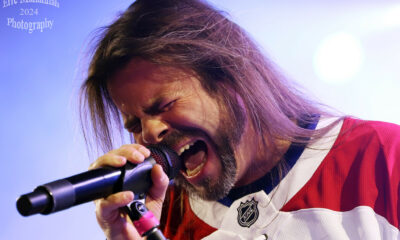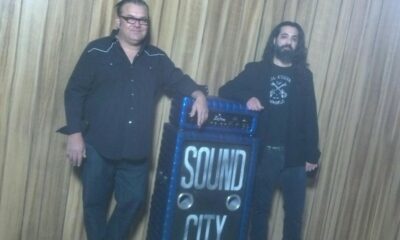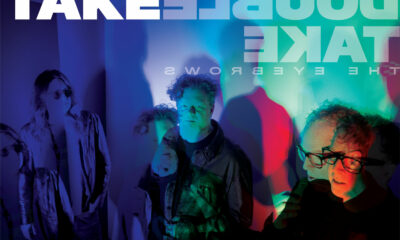Alternative/Rock
Last In Line Guitarist Vivian Campbell Discusses the Band, New Album ‘II’ and his Relationship with Ronnie James Dio
Last In Line and Def Leppard guitarist Vivian Campbell talks about new album ‘II, his relationship with Ronnie James Dio and more.

Following the completion of Def Leppard‘s 2018 world tour, guitarist Vivian Campbell had some time in his schedule to get together with his bandmates in Last In Line to, not only play a few shows, but to finish their long-awaited new album II. The album is out now so we spoke to Vivian about the album, the band, Def Leppard and his relationship with the iconic Ronnie James Dio.
The new Last In Line album is finally due out but it appears to have been in the works since 2017. When did you all get together to talk about it properly?
Vivian: “It did take a while yes. With everyone else having a day job, mine being Def Leppard who had a very busy year last year, it’s always been very difficult. It was the same on the last album, Heavy Crown, we’re always trying to fit in writing and recording sessions around everyones schedules. It was the same with Jeff Pilson who recorded this record and the first album, he’s super busy with other stuff and Foreigner do a lot of shows as well.”
I wanted to get the record out sooner but we kind of had to do it piecemeal so we’d come up with three or four song ideas then send them to Andy and go back and forth like that. Andy would then work on them and fly to LA then when we had say three or four songs, we’d try and book some studio time when Jeff was available so we could go in and cut the tracks. You know, it kind of went on like that for about a year. It took a lot longer to write than I would have liked. In an ideal world it would have been like it was in the ’80s where you would have a proper recording budget then you’d book a few months to go into a studio to write and record an album in one go when you can focus solely on the album. It’s very difficult to do that with the state of the industry these days and, as well, with it being a side project, we didn’t have the luxury to do it like that.”
You were obviously aware of the intense schedule Def Leppard would have in 2018, does it take the pressure off you having to write an album because it is a side-project?
“No, it’s a very serious project for me and has been for several years. In fact, I don’t think I’ve ever worked this hard as I have in recent years. That’s fine, I wouldn’t have it any other way and I’m very, very committed to this band, obviously Def Leppard is the day job and we’ve had to move the goalposts a few times because of Def Leppard but that’s expected, it happens. It is a very serious project though and, when I’m not working with Def Leppard, I’m working on Last in Line. I have very little time off. In fact, it’s got to the point where I’m starting to question the wisdom of that and I’m thinking I do need to book some time off to spend with my family and other things.
We’re full on though, we’ve been doing shows for a while now and we’ve got more shows coming up until the middle of May which is about when I start rehearsing with Def Leppard again for our Summer shows. It’s all go!”
You wouldn’t have it any other way though?
“I wouldn’t. I really enjoy it. I enjoy playing with both bands as they’re both very different bands. Def Leppard is a really, really polished show, lots of vocals, the production is really high-end, it’s really slick whereas Last in Line is four guys in black t-shirts but that’s very cathartic to me as I just want to play guitar and concentrate on that you know?”
How does the writing process work and has it ever changed?
“Again, two very different writing processes. With Leppard we’re all very focussed and, yes, people can bring in songs as I think we have proven ourselves to be very capable songwriters but it’s not just a case of coming up with eleven or twelve songs for an album. With Last in Line, we didn’t start with songs, much in the same was as we did in the ’80s with Ronnie on the Holy Diver, Last in Line and Sacred Heart albums. You know, we’d start with a riff then we’d just go into a studio and jam and that’s a very, very different level of work. In Leppard, we don’t go in and jam ideas you know? Like I said we target what is needed. With Last in Line, it’s the total opposite, we just we start playing or Phil would have a riff for Andy or Vinnie would even have an idea. He’s a really creative drummer and sometimes you know a lot of ideas have actually come around just from Vinnie playing a beat.He’s such an inspiring drummer to me.
It’s happened on many occasions where we just kind of go back and forth and it is a great way to work for the band when everyone is involved in a very hands on kind of way. Over the last two or three years, we’ve played a bunch of shows and we’ve really kind of gelled and gotten to know each other musically and I feel, with this album, we’ve really find our sound. The Heavy Crown album had overtones of early Dio and yet had other songs that were kind of something entirely different. For the most part the songs on the Heavy Crown album were very straightforward with the exception of maybe “The Sickness” which is a love song on that album.
On the second album I feel that there’s a lot more ambition and adventure in the songwriting. We weren’t content with just the verse-bridge-chorus for a lot of these songs, we kind of went off on these little left turn excursions. It was really kind of stretching us musically and I think a lot of that has to do with Phil as a bass player. I think he’s a bit more kind of bass player like Geezer Butler where they know how to really play the song.”
We’ve talked about the writing process and your day jobs. Does it help knowing that, because you write piecemeal, that you can go away and know that when you come back there’s gonna be a whole lot of ideas from those people rather than having to go to the studio and think “right, I’ve got to bang out like 10 songs”?
“I think even going back to the old days you know right with Jimmy Bain where we used to go in and just kick around ideas. I mean we could relatively easily come up with some sort of music for Ronnie to write a lyric off.
The same is absolutely true Phil. And it’s absolutely true of Andy. I mean Andy writes really, really quick. You know sometimes he’ll give us direction on the music. He writes like Ronnie. I mean he writes really, really quick. He doesn’t take months to write a lyric and certainly doesn’t take months to sing it. It was as though, as a singer and as a writer, he’s really kind of come into his own on this album.
I think he’s really found his niche you know? Yes he’s got great lyrics and he doesn’t sound anything like Ronnie. Honestly, this whole project would never have happened if he had been like that. I think to have any singer that is a cheap Ronnie clone would just be tacky. So I think a lot of people, when I read things, I feel kind of missed the mark on that. You know they still are totally missing the point. I mean this is an entirely different band. Yes, the origins of the band are obviously from the original Dio band and when Vinnie and I play together you know we have a certain sound that’s obviously reminiscent of us but Andy and Phil bring an entirely different flavor to it. So, we really gelled on this record.”
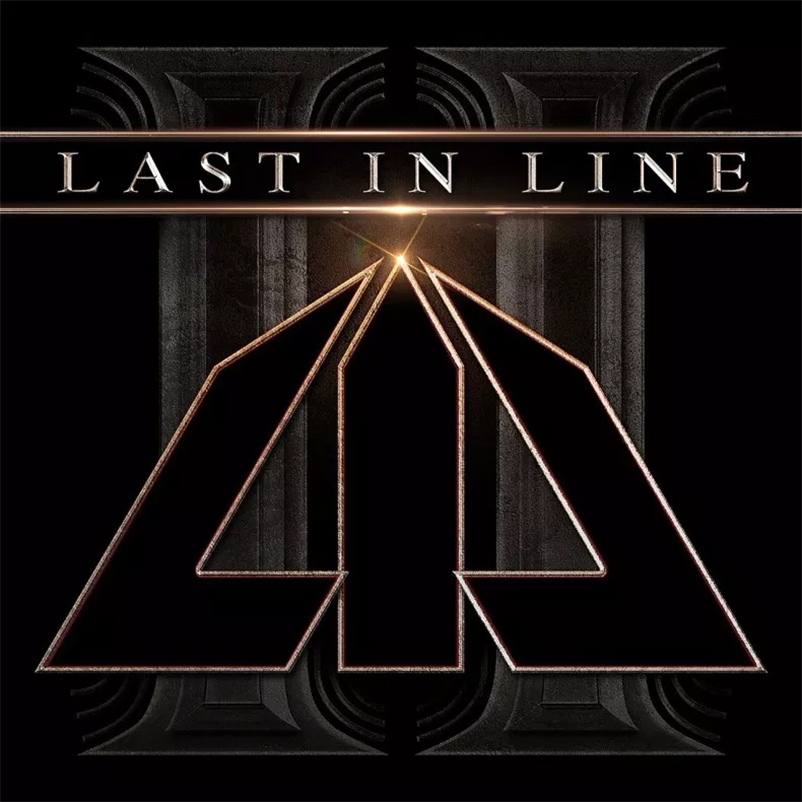
How challenging is it from a musician’s point of view to write material that not only pushes you as a musician and as a band but is also fitting to what is quite an iconic legacy?
“Well we don’t think about the legacy aspect of it then we don’t have anything looming over us when we write. Yes the legacy is always gonna be there to a certain extent, like I said, because of the sound and the way we play. It’s still a big part of our life. So you know even though we still play the old classics we play less of them. Not because we don’t want to play them but because we’ve got two albums of original material to draw from. We will always reference that in our live shows and that will always be there in the background as part of the band.”
Okay, just moving forward then. Back in January 2016 you sadly lost Jimmy. How difficult was that period for the band?
“Oh it was brutal. I mean it just totally pulled the rug out from under us. I mean Jimmy was a big, big part of the band. He was a good friend of ours. Jimmy was so invested in the band he actually only had one tattoo on his body when he died and that was Last In Line. He was really committed to it. In the last few years of Jimmy’s life it was really rough for him and I think the band and the whole project, the writing and the recording of it, really gave him focus. So we had a whole tour booked then, when Jimmy passed away, it just totally took the wind out of our sails and we cancelled the tour.
After several weeks Vinnie and Andy and I sat down, we talked about it at length and said we owe it to Jimmy. We owe it to his memory and we owe it to ourselves to continue this. When Phil walked into the room and started playing we knew right away. It was unanimous with Andy, Vinnie and I that he was the guy for us. Phil played with Ozzy back in the 80s when we were with Ronnie so he really kind of understood the genre. He’s someone we’ve known. I mean I kind of knew Phil casually over the years. He was well into the band plus he’s English and he has that sensibility that keeps the balance of the band.
We have a really good time together. We laugh a lot and that’s an important part of the chemistry of a band. We can connect as human beings and not just as musicians you know? We decided to pick the tour up so we booked a few more shows and we played a bunch of shows in the last couple of years. The whole sound of the band has gelled and we’ve really got to know each other and it’s great fun to play with these guys. We always have a hoot on stage and it’s always a good time – there are a lot of smiles.”
https://youtu.be/jK44adkLgDs
You’ve touched on Andy again fronting the band. When he joined the band was it was a conscious decision to get someone that didn’t sound like Ronnie?
“Well it wasn’t even a conscious decision to form a band. It literally grew out of a jam and it was only when Vinnie suggested that we get this guy Andrew Freeman in because he’s a really great singer. I just wanted to jam with Jimmy and Vinnie as I’d just come off doing a tour in late 2010 early 2011 and that tour just got me so jazzed up about planned aggressive rock guitar again.
It just instills such an excitement in me and I’d just came off of the tour and just really wanted to reconnect with my inner 17 year old when I played aggressive rock guitar like that. Obviously that relates to the early days of albums and the stuff I did with Sweet Savage so I just called Jimmy and Vinnie and we went into a room in about the middle of 2011. I think it had been about 27 years since we played together and, well, the chemistry was just immediate. We all got goosebumps and were just really excited about it. It was from that point on that Vinnie said I know this guy Andrew. He gave me a call then came down and started singing and when I heard Andy singing Ronnie’s lyrics it sounded nothing like Ronnie but was equally passionate and powerful and strong.
That’s when I had the idea to go out and do some gigs and I immediately said you know let’s go and do some stuff. Let’s call it Last in Line and it seemed like an appropriate title at the time as Ronnie had passed away about a year before that so, Vinnie and I were the Last in Line and, obviously, as that was the name of a song and an album that we had written it would fit right.
In hindsight, had I known that we were going to proceed and make this a more serious project and actually write and record our own music I wouldn’t have called the band Last In Line. The original thought was just to play some club shows around L.A. which is what we did and then over the years it kind of grew and we were invited to play in the U.K. and Japan and then you know eventually we got a call from Frontier’s asking if we’d be interested in doing a new album of original music. We didn’t have that thought or that ambition when we started it which is another reason why I named the new album Two. Not only do I think it really fits with it being the bands second album so I wanted to draw attention to that but I also wanted to streamline the naming of the band a little bit.
I sensed that on the Heavy Crown album there was a little bit of confusion for people who weren’t aware of the history of the band which is most people to be honest. People were getting a little bit confused because it’s the name of the Dio album, the name of the band, people couldn’t work out which was which. So I wanted to kind of streamline that and, as we move forward here, it’ll still say Last In Line but I’m also going to kind of try and focus a bit more on trying to bring a little bit of clarity to the marginal fans who maybe haven’t followed the history of the band you know?”
On the subject of the history, your relationship with Ronnie has been well documented. What are your memories of that era?
“Despite what’s been written, it wasn’t all bad with Ronnie. Yeah, people ask me all the time what Ronnie was like. The thing is, we’re all human beings, we’re very complicated and it’s not all black and white. Ronnie could be very, very charming and very funny, really funny. Like I said earlier with Last In Line, we would have a good laugh together with Ronnie back in the day but, the other side of the equation was Ronnie could also be very dark and angry. He was very quick to anger and he could become almost abusive verbally you know? We all have good days and bad days.
In terms of my particular relationship with Ronnie I felt he was very proud of me when I first joined the band and he liked exposing me to the world. Like look what I found in Ireland, this guitar gem. Yeah, he kind of felt like I was his Randy Rhoades and I think he took pride in presenting me like that.
I will accept responsibility for a lot of the weirdness because, when I approached Ronnie and I joined the band, I was a Dio fan. I mean I was listening to Long Live Rock and Roll, Heaven and Hell and Mob Rules for years before I was part of the band. I was a fan of Ronnie and so it was very bizarre for me to be all of a sudden to be in his band. I mean I was very uncomfortable around him because he was a rock star in my eyes. I think that kind of set the tone for the relationship. I was just very uncomfortable around him because of that. He was really proud of me and kind of wanted to protect me from a lot of the weirdness that L.A. in the 1980s had so it was kind of like, and I’ve said this before, and I genuinely don’t mean this disrespectfully, but it was a little bit like being in a band with your stepdad.”
Given that you were such a massive fan, was that a difficult time for you?
“Ronnie was a lot older than me and obviously well-known and experienced and I was just this green kid from Belfast. I had a difficult sort of back and forth with Ronnie and still, after all these years, people think that I left the band which is utter bollocks. I was fired from the band and people also are glib about it in a way and say it was about money and that I wanted more money. Yeah I wanted more money because it had been promised but it wasn’t really the reason I was fired from the band. It wasn’t about money as much as it was about principle. I stood on the principle Ronnie had made us a promise that, by the third album, it would be an equity situation and we work like that. We worked for next to nothing, we earned less than the road crew.
We were on tour and we wrote the music with Ronnie. We made the records. We didn’t get any of the concert sales, we didn’t get any of the t-shirt sales or merch. We got none of the record sales. We worked for fuck all and we were happy to do it because we were promised that, by the third album, if the band was successful, which it was, we would make it an equity situation. I called him on his word and that’s what got me fired. It wasn’t that I was going in there banging the desk demanding more money. I was wanting the man to fulfill his obligation and keep his promise and, for whatever reason, and I could speculate about that but I’m not going to, he decided that he would fire me instead.”
How did that feel?
“It really hurt me for many, many years and it left a bad taste in my mouth. I wanted nothing to do with Dio, with the music, with the records and it wasn’t until Ronnie passed away that I was able to kind of look at it differently. It’s strange maybe because that presence was no longer on Earth and Ronnie was gone that I could I could look back on it and I looked back in a totally different way that it wasn’t just Ronnie’s work. It was my work and his and Jimmy’s. We crafted those songs, we made those records, we toured, we made it successful. It’s as much our legacy as it was Ronnie’s. I have a totally different viewpoint towards it now and I completely embrace it and I love playing it. It really makes me happy and seeing the joy on people’s faces when we go out there and we play Rainbow In The Dark or Holy Diver or Last In Line, the songs that we created, it makes people happy and that makes me happy. People look at those songs in the same way you look at those Dio songs or Thin Lizzy songs as a fan.”
Playing with quality musicians, it must be good to know that you can all go to your day jobs and just come back and pick it up again?
“Yeah, we’ve all talked about this. When you go and do these things, it kind of recharges your batteries for when you go back to the day job. I mean Def Leppard are playing better than we ever have, we just get better and better year after year. The vocals get just more and more spectacular, the playing becomes more nuanced both because of the experience we have collectively and individually, but it’s also in part because we get to go off and exercise different muscles as musicians and then come back to the day jobs. Yeah it keeps it energized and it’s a win-win all around.”
I was going to ask as you’ve actually raised a point I’ve been talking about this week. I saw Slash recently playing in a sports hall in Doncaster in Yorkshire. I wondered, from a musician’s point of view, when you’re at a level where you’re going out and doing sports stadiums and arenas and selling out festivals, what is it like going back to playing somewhere like a club with a capacity of a few thousand?
“It’s wonderful. I mean it’s actually a lot more intimate and I’ve always maintained that it’s easier to play the bigger shows because the audience is further away and they’re kind of the audience that is more a concept than a reality. When you play a club or a small theater you can see the whites of people’s eyes. So I find it kind of intimidating but at the same time stimulating and I do enjoy both. The thing about it is, with Def Leppard, we really grow into the bigger shows like the bigger the venue the better. Everything about Def Leppard lends itself to be bigger and spectacular. Everything is to the max. Then last year we did a bunch of shows with Journey in North America including 10 baseball stadiums and I think that we actually really played our best in the stadiums like the bigger the venue the more room there is for us to breathe and for our show to come alive.
I mean it’d be lovely for Last in Line to play some bigger shows too and I think we could definitely pull it off but, right now, given our status and our budget it’s like I said it’s four guys in black T-shirts just standing there giving it all. It’s a very very different experience but I thoroughly enjoy both.”
Last In Line’s album II is out now and can be purchased from the Frontiers Records online shop
-

 Music5 days ago
Music5 days agoTake That (w/ Olly Murs) Kick Off Four-Night Leeds Stint with Hit-Laden Spectacular [Photos]
-

 Alternative/Rock7 days ago
Alternative/Rock7 days agoThe V13 Fix #010 w/ High on Fire, NOFX, My Dying Bride and more
-

 Alternative/Rock2 weeks ago
Alternative/Rock2 weeks agoA Rejuvenated Dream State are ‘Still Dreaming’ as They Bounce Into Manchester YES [Photos]
-

 Features5 days ago
Features5 days agoTour Diary: Gen & The Degenerates Party Their Way Across America
-

 Culture1 week ago
Culture1 week agoDan Carter & George Miller Chat Foodinati Live, Heavy Metal Charities and Pre-Gig Meals
-

 Music1 week ago
Music1 week agoReclusive Producer Stumbleine Premieres Beat-Driven New Single “Cinderhaze”
-

 Alternative/Rock1 week ago
Alternative/Rock1 week agoThree Lefts and a Right Premiere Their Guitar-Driven Single “Lovulator”
-
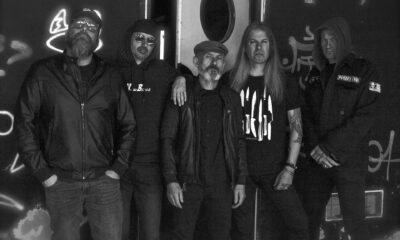
 Alternative/Rock1 week ago
Alternative/Rock1 week agoDeath Wishlist Are Fiery and Fierce with Their “I Get Bored” Video Premiere

